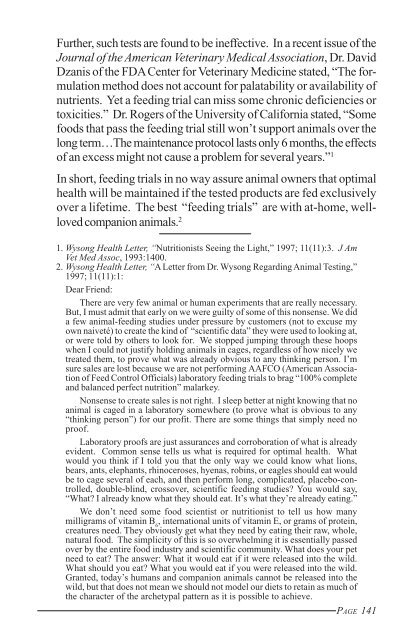The-Truth-About-Pet-Foods
The-Truth-About-Pet-Foods
The-Truth-About-Pet-Foods
You also want an ePaper? Increase the reach of your titles
YUMPU automatically turns print PDFs into web optimized ePapers that Google loves.
Further, such tests are found to be ineffective. In a recent issue of the<br />
Journal of the American Veterinary Medical Association, Dr. David<br />
Dzanis of the FDA Center for Veterinary Medicine stated, “<strong>The</strong> formulation<br />
method does not account for palatability or availability of<br />
nutrients. Yet a feeding trial can miss some chronic deficiencies or<br />
toxicities.” Dr. Rogers of the University of California stated, “Some<br />
foods that pass the feeding trial still won’t support animals over the<br />
long term…<strong>The</strong> maintenance protocol lasts only 6 months, the effects<br />
of an excess might not cause a problem for several years.” 1<br />
In short, feeding trials in no way assure animal owners that optimal<br />
health will be maintained if the tested products are fed exclusively<br />
over a lifetime. <strong>The</strong> best “feeding trials” are with at-home, wellloved<br />
companion animals. 2<br />
1. Wysong Health Letter, “Nutritionists Seeing the Light,” 1997; 11(11):3. J Am<br />
Vet Med Assoc, 1993:1400.<br />
2. Wysong Health Letter, “A Letter from Dr. Wysong Regarding Animal Testing,”<br />
1997; 11(11):1:<br />
Dear Friend:<br />
<strong>The</strong>re are very few animal or human experiments that are really necessary.<br />
But, I must admit that early on we were guilty of some of this nonsense. We did<br />
a few animal-feeding studies under pressure by customers (not to excuse my<br />
own naiveté) to create the kind of “scientific data” they were used to looking at,<br />
or were told by others to look for. We stopped jumping through these hoops<br />
when I could not justify holding animals in cages, regardless of how nicely we<br />
treated them, to prove what was already obvious to any thinking person. I’m<br />
sure sales are lost because we are not performing AAFCO (American Association<br />
of Feed Control Officials) laboratory feeding trials to brag “100% complete<br />
and balanced perfect nutrition” malarkey.<br />
Nonsense to create sales is not right. I sleep better at night knowing that no<br />
animal is caged in a laboratory somewhere (to prove what is obvious to any<br />
“thinking person”) for our profit. <strong>The</strong>re are some things that simply need no<br />
proof.<br />
Laboratory proofs are just assurances and corroboration of what is already<br />
evident. Common sense tells us what is required for optimal health. What<br />
would you think if I told you that the only way we could know what lions,<br />
bears, ants, elephants, rhinoceroses, hyenas, robins, or eagles should eat would<br />
be to cage several of each, and then perform long, complicated, placebo-controlled,<br />
double-blind, crossover, scientific feeding studies You would say,<br />
“What I already know what they should eat. It’s what they’re already eating.”<br />
We don’t need some food scientist or nutritionist to tell us how many<br />
milligrams of vitamin B 6<br />
, international units of vitamin E, or grams of protein,<br />
creatures need. <strong>The</strong>y obviously get what they need by eating their raw, whole,<br />
natural food. <strong>The</strong> simplicity of this is so overwhelming it is essentially passed<br />
over by the entire food industry and scientific community. What does your pet<br />
need to eat <strong>The</strong> answer: What it would eat if it were released into the wild.<br />
What should you eat What you would eat if you were released into the wild.<br />
Granted, today’s humans and companion animals cannot be released into the<br />
wild, but that does not mean we should not model our diets to retain as much of<br />
the character of the archetypal pattern as it is possible to achieve.<br />
PAGE 141


